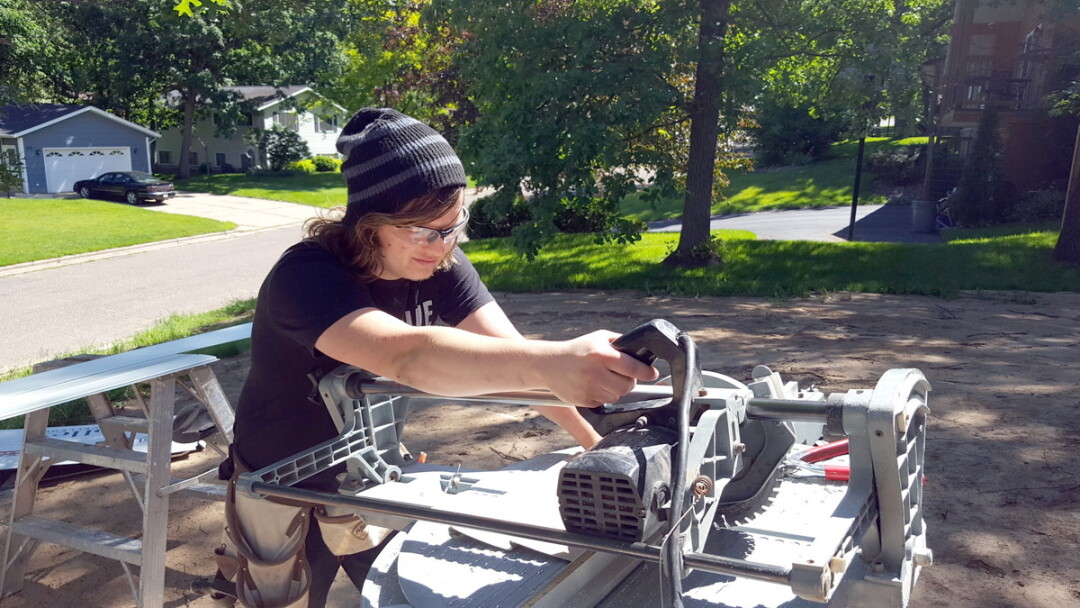Building Fresh
program helps at-risk youths rebuild lives, one two-by-four at a time

Before signing up for the Fresh Start Program, the biggest thing Travis Rosciszewski had ever built was a skateboard ramp.
Now the biggest thing he’s ever built is a house.
In the process of spending nearly a year learning about construction hands-on, the 18-year-old has also hoisted and hammered his own life back toward the straight and narrow.
Travis, of Eau Claire, was one of 12 participants in the Fresh Start Program who finished building a new house earlier this summer on the south side of Altoona. Fresh Start, a program operated by the Western Dairyland Community Action Agency, involves at-risk young people ages 16 to 24 building homes, which are then sold to income-eligible families. Since the program began in western Wisconsin in 1998, more than 400 young people have helped build 26 houses.
Travis, 18, says he was on a downhill path in life before he got into the Fresh Start program. At the suggestion of his social worker, about 10 months ago he applied for the program. Previously, Travis had a spotty educational record. However, Fresh Start helped him enroll in the Eau Claire school district’s McKinley Charter School, from which he graduated in January.
He credits support from the program’s staff for his success. “They were actually there,” he stresses. “If you needed something, they would help.”
Fresh Start program manager Katie Hulbert says that, in addition to teaching practical construction skills, the program helps participants learn “soft” job skills (such as resolving workplace conflicts), perform community service, and (if needed) complete work toward a high school diploma or its equivalent. “When they’re done here, the goal is to have a vocational map for their future,” Hulbert says.
The program is funded through a variety of sources, including AmeriCorps/Serve Wisconsin, the state Department of Corrections, the Department of Administration’s Housing Division, the United Way, Xcel, Royal Credit Union, the Eau Claire County Housing Authority, and the Arnold and Lois Domer Foundation. At any given time, the program has 10 to 15 participants; most are male, but this year one young woman participated. While the program tries to make the construction site as much like real worksite as possible, there are differences.
“It’s a little slower pace, but that’s fine,” says Luke Steffen, the on-site supervisor. “We’re more interested in teaching them a skill than being a (construction) company.”
Steffen says he’s not trying to turn all the participants into construction workers; rather, he hopes to instill in them a work ethic. The youths come in with various levels of maturity, and they have to learn basic work skills such as timeliness, using appropriate language, and generally losing their “I don’t care” attitudes, he says.

While the program includes performing community service, pursuing education, and learning jobs skills, it is actually a paying job, too – and not necessarily an easy one.
“There was very little room for error,” Travis said of working 32 hours a week under the watchful eye of Steffen. “We had to do everything right.” Once, when he literally made a misstep while working on insulation, his foot nearly went through a ceiling; at another time, the workers had to put up drywall three times in the bathroom before it was up to snuff.
Between last October and June, Travis and other program participants – among other things – framed the home; installed hard flooring, windows, doors, and trim; put up drywall and cabinets; sided and insulated the house; and painted. (Professional contractors poured the concrete and did the electrical, plumbing, and HVAC work.) The final result was a three-bedroom, one-bath ranch home with a sunken two-car garage, a spacious front porch, and a 12-by-12-foot back porch.
Now that he’s completed the program, Travis is looking for a full-time job, a task he believes his experience with Fresh Start will help him achieve. In addition to practical job and social skills, Fresh Start offers a grant to help participants pursue post-secondary education. Travis might not take advantage of the grant right away, but he’s hopeful his experience with Fresh Start will help him pursue a job in construction, operating a forklift, or truck driving.
So what advice would he give to someone considering the program? “I would say take it,” Travis says without hesitation. “This program helped me change my life.” While he hasn’t completely turned his life around, Travis says he’s done at least a 170-degree rotation.
Hulbert agrees that the program can put participants on a new path. “The biggest thing is seeing that there’s a different life that they can lead,” she says. “They can drive past that house and say, ‘I built that.’ ”
Do you know someone who could benefit from the Fresh Start Program? You can learn more by calling (715) 836-7511, ext. 1130, or find an application online at www.westerndairyland.org/fresh_start.phtml.
WESTERN DAIRYLAND TURNS 50
The Western Dairyland Community Action Agency is hosting a 50th Anniversary Community Celebration 4-7pm Thursday, Aug. 25, at 418 Wisconsin St. in downtown Eau Claire. The free celebration will feature live music from The Shillelagh Lads, wood-fired pizza, face painting, balloon animals, raffle prizes from local businesses, and more. Western Dairyland staff members, clients, and community partners will be there to help the agency celebrate 50 years of making a difference in western Wisconsin.


















